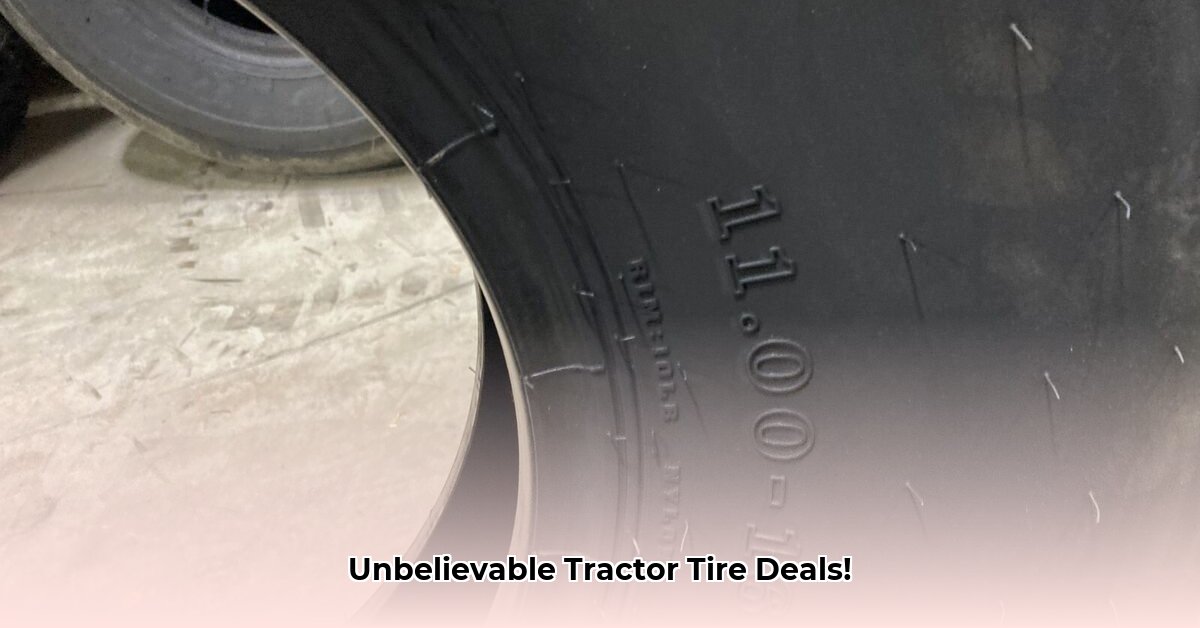
Finding the right tractor tires can be a challenge. This guide focuses on 11.00-16 tractor tires, specifically the durable 4-rib, 12-ply variety, offering actionable advice to help you secure the best deals while minimizing risks. We'll cover everything from understanding tire specifications to navigating the online marketplace, ensuring you make an informed purchase. For more tire options, check out our guide on other tractor tire sizes.
Understanding Your Needs: Matching Tires to Your Work
Before diving into deals, consider your tractor's workload. Heavy-duty plowing demands different tire specifications than lighter tasks. Knowing your usage helps you prioritize essential features. These 11.00-16, 4-rib, 12-ply tires are built for demanding agricultural applications.
The 12-ply rating signifies robust construction—multiple layers of rubber and fabric for superior durability. The four-rib tread provides excellent traction, especially in wet or muddy conditions; less slippage translates to increased fuel efficiency. However, this durability comes with a potentially higher initial cost. Is the long-term benefit of increased tire lifespan and reduced fuel consumption worth the higher upfront investment?
Exploring Your Options: The World of 11.00-16 Tractor Tires
Multiple brands and suppliers offer 11.00-16 tires, each with varying strengths and weaknesses. Some boast extended tread life, while others emphasize puncture resistance. Researching different brands and reading online reviews allows you to compare specifications and find the best fit for your needs and budget.
Bulk Buying: Savings vs. Risks
Bulk purchasing often translates to significant savings per tire. However, larger orders require more storage space and a greater upfront investment. Additionally, the quality control might be less rigorous in bulk purchases, increasing the risk of receiving damaged or defective tires. It's a calculated risk; substantial savings are possible, but you need to assess the space, time commitment, and risk tolerance.
Bulk Buying: A Cost-Benefit Analysis
| Feature | Advantages | Disadvantages |
|---|---|---|
| Cost per Tire | Potentially huge savings | Requires a larger initial investment |
| Availability | Easier to access less common sizes | Possible shipping delays |
| Warranty | Potentially less comprehensive | Increased risk of receiving damaged or defective tires |
| Storage | Requires significant storage space | Increased logistical challenges |
Navigating the Online Marketplace: Smart Shopping Strategies
Online marketplaces offer convenience and competitive pricing. However, the inability to physically inspect tires necessitates a cautious approach.
Actionable Steps for Online Purchasing:
- Scrutinize Images: Demand multiple high-resolution images from various angles. Look for any inconsistencies.
- Read Reviews: Thoroughly assess customer reviews, paying attention to both positive and negative feedback.
- Engage Sellers: Ask detailed questions about tire condition, warranty, and return policies. A responsive seller is key.
- Use Comparison Tools: Utilize online comparison tools to find the best prices across various platforms.
Understanding Ply Ratings and Tread Patterns
The 12-ply rating indicates twelve layers of rubber and fabric, contributing to the tire's resilience and load-carrying capacity. This robust construction translates to a longer lifespan and less risk of premature failure. However, higher ply ratings can sometimes result in a slightly firmer ride.
The four-rib tread pattern enhances traction, especially in wet conditions. This improved grip contributes to better fuel efficiency and extends the tire's operational life through decreased slippage.
Making an Informed Decision
Buying 11.00-16 tractor tires is a substantial investment. Meticulous research minimizes the risk of costly mistakes. Weigh the benefits and drawbacks of bulk buying, critically evaluate online sellers, and understand the significance of ply ratings and tread patterns. A thoughtful approach ensures you obtain the most cost-effective and long-lasting tires for your needs.
How to Assess Used Agricultural Tire Condition Before Buying Online
Buying used 11.00-16 tractor tires can significantly reduce costs, but careful inspection is paramount. This section provides a step-by-step guide to ensure you avoid costly mistakes.
Key Takeaways:
- Significant cost savings are possible with used tires, but diligent inspection is crucial.
- Online marketplaces and local dealers offer used tires.
- A comprehensive inspection checklist helps avoid costly errors.
- Understanding tire specifications (ply rating, rib pattern) is essential.
- Weigh the long-term cost reduction against potential risks of premature failure.
Pre-Purchase Inspection Checklist:
- Visual Examination: Check for cuts, bulges, cracks, or embedded objects. Request multiple high-resolution photos.
- Tread Depth Measurement: Use a tread depth gauge to ensure adequate remaining tread.
- Sidewall Assessment: Examine sidewalls for cracks, cuts, or unusual wear patterns.
- Age Verification: Check the manufacturing date code on the sidewall; older tires may have degraded rubber.
- Uniformity Check: Inspect for any inconsistencies or imperfections in tread or sidewall.
- Engage the Seller: Ask detailed questions about the tires' history, usage, and return policies.
By following these steps and understanding the specifications of your target tires, you can confidently purchase reliable 11.00-16 tractor tires that meet your needs and your budget.